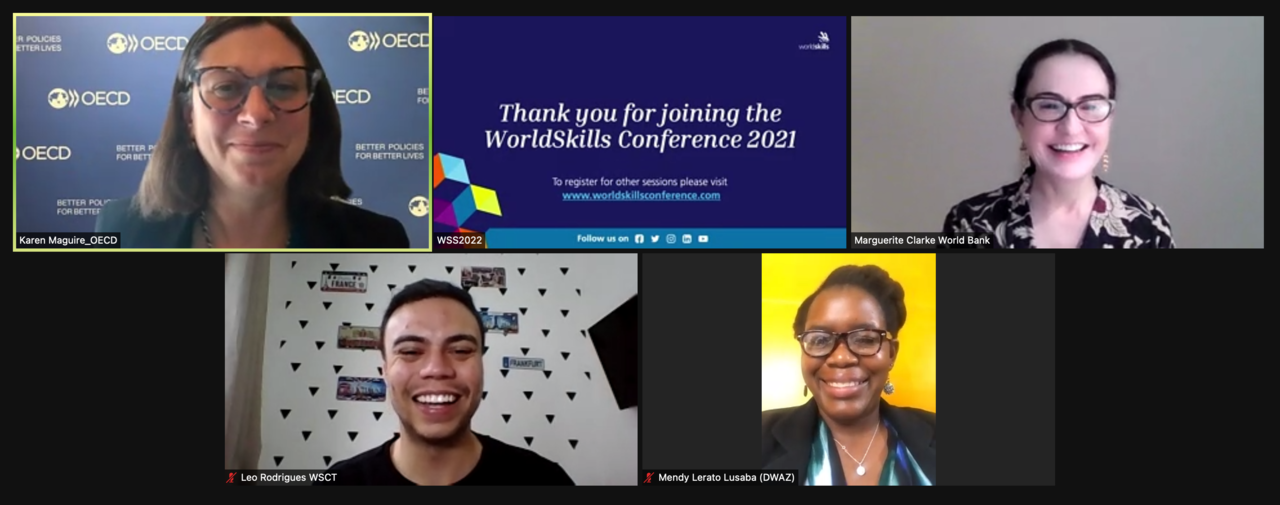27 October 2021
WorldSkills Conference 2021 — Strengthening inclusivity
Skills - and the power they have to promote diversity and inclusion while lifting millions out of poverty was an uplifting theme of this year’s WorldSkills Conference.

The virtual format of this year’s Conference allowed speakers to join from all over the world and in time zones that ranged from early in the morning to late at night.
They included Mendy Lerato Lusaba, representing Zimbabwe’s Domestic Workers Association and from Brazil, Leo Fonseca Rodrigues, the WorldSkills Champions Trust Regional Representative for the Americas.
The topic of their session was the part skills can play in creating a pathway out of poverty.
The poverty levels in Zimbabwe are “alarming” said Ms Lubasa, with high levels of unemployment. But by offering training to over 100,000 domestic workers “they are also able to get better paying jobs”
“We believe that once they are able to get better jobs and better salaries, they are also better able to help their families.”
That meant being able to send their children to school and provide hospital care for parents. “They are also able to take better care of themselves which they were not able to do when they were unemployed.”
Leo spoke movingly of what he called “my life changing experience with skills” from the favelas of Rio De Janeiro to becoming a world-class jeweller. “My parents didn’t have much money but what they gave me was priceless,” he said. “The knowledge and support to achieve all my goals.”
A second-panel discussion looked at the role governments and local organizations can play to create economic growth and employment opportunities that reduce poverty and create more equal societies.
It was moderated Raffaele Trapasso, a senior economist with the OECD, with panellists including Hiromichi Katayama, a specialist in youth and skills development with UNESCO.
Training programmes had been badly distrupted by COVID-19, particularly in developing countries, Mr Katayama said. This was caused by a lack of facilities equipped for remote training, but also because teachers were not trained to deliver remote learning while students frequently did not have equipment like laptops and tablets to re
“As a result, we have observed that the practical training has been suspended.”
In addition, “we saw that many parents lost their jobs and were not able to pay the training fees for their children. Dropping out of vocation training has increased.”
The discussion also heard from the WorldSkills Champions Trust’s Yousra Assali, the Regional Representative for Middle East and North Africa (MENA).
“Especially in MENA a large number of students found that distance learning was ineffective and amplified inequalities due to lack of resources, limited access and lack of support,” she said. “Even for myself, as a student, I have been through these challenges.”
On a more optimistic note, the final session of day three looked at projects and new practices developed during the WorldSkills Year of Innovation.
Contributions and examples came from Carlos Fonseca, the Technical Delegate for WorldSkills Portugal, Konstantin Kaysin, WorldSkills Russia’s head of innovations, WorldSkills Russia, Nader Imani, head of global education for Festo Didactic and Frank Nanfara, president and CEO of Studica, a WorldSkills Global Partner.
“It was a pretty harsh year due to the pandemic,” outlined session moderator Ekaterina Loshkareva, a WorldSkills Board member. “But I think you all would agree that the WorldSkills community, globally and nationally, managed this challenge beautifully because not only were a lot of events not cancelled but a lot of new projects, ideas and practices were developed.”